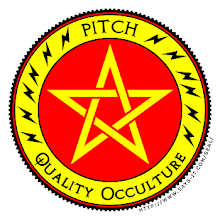I begin with a simple observation--real differences exist between today's Christianity and Neo-Pagan Craft. Neo-Pagan Craft is not a movement within Christianity, but a separate movement that holds tenets other than Christian tenets, proposes spiritual insights and transformations other than those Christianity proposes, and offers ways of living on the Earth other than those Christianity offers.
Even when, as is sometimes the case, the two share common ground.
If such differences did not exist, then nobody from the Neo-Pagan Craft side, including me, would bother saying that he or she is not a Christian. Some Crafters, me included, have no affiliations with any Christian denomination or movement. We realize that, whatever a Christian might be, we are not Christians. We are Crafters.
When I try to describe some of the differences that I note, the schema of Christianity compared with Craft is fairly simple. That's because the tenets, insights, and ways of living are fairly basic ones--monotheism vs. polytheism, sin vs not-sin, salvation vs. not-salvation, clergy vs. not-clergy,
mediated experience vs. direct experience. A schema like that will not account for all the variation within Christianity or within Craft. Every Christian denomination or movement may not hold identical understandings of monotheism. Every Craft trad or movement may not hold identical understandings of polytheism.
That sort of thing does not show up in my simple schema.
Still, real differences between Christianity and Neo-Pagan Craft remain. Even allowing for ranges of interpretation and understanding in both Christianity and Craft. Christian polytheism--to the extent that such a notion can be discussed--does not resemble Craft polytheism. Within Craft, some trads may not hold to polytheism, but monotheism, duotheism, or non-theism.
I think that my schema is correct in general, even when it does not serve well in every instance of detailed variation within Christianity and Craft. I admit that some Christian denominations and movements may share more with some Craft trads and movements, that overlaps of understanding and observance exist, and that adherents do mix and blend elements of Christianity and of Craft. And, as I've said in an earlier post, direct spiritual experience and changes it brings about may overwhelm differences in a sense of unity, oneness.
Something I've noted as I've taken part in this blog carnival is that I appear to be less taken by Christianity than many of the other bloggers. My habits of practice do not overlap much with Christian ones. I don't follow Christian history, commentary, or literature closely, and don't see much there to nurture my own spirituality.
I resist assimilation of Craft by Christianity. I think that assimilation happens when many small, seemingly harmless changes, once accepted, emerge as some bigger, harmful ones. So I'm suspicious of small, apparently harmless changes. In addition, I think that if or when bigger, harmful changes emerge, Neo-Pagan differences will be submerged in some sort of Christianity. That Neo-Pagan Craft is in much greater jeopardy from accumulating little changes in its subculture than Christianity is. And that I, a Neo-Pagan Craft practitioner, value the independence and uniqueness of Craft.
Subscribe to:
Post Comments (Atom)


2 comments:
Hi Pitch,
I'd have to say which Craft are you speaking about here? If you're talking about a specific tradition, like Gardnerian or Alexandrian, I could perhaps understand your concern. But, it seems that the vast numbers of folks who call themselves wiccan are self-initiated.
The other thing to consider is that, perhaps, even classical wicca has influences from monotheism. Gardner came firmly from the British Magical Tradition which is chin deep in qabala. The Wheel of the Year, as a concept, was ghost written by Ross Nichols for Gardner(footnote in Triumph of the Moon) - they were great friends and hung out at the same naturist colony. Nichols was an esoteric Christian and the founder of the Order of Bards, Ovates and Druids (an Order that (most of the time) manages to encompass mono, duo, poly and non-theists and to which I belong.)
If the Craft is in constant change ,is not monolithic and is probably monotheistic influenced anyway then perhaps the issue is really the danger to the individual Crafter. Is it possible that too much Sky God can obliterate the memory of deities and spirits of Earth and Water? It may be that some gods are more vocal and demanding than others - but that's true of more gods than the one in the various Books.
peace and health,
david
/|\
One difficulty with pointing out the Craft is not monotheistic has to do with how quickly the movement has growm, and in how many different directions.
Still, the founders of the British post WII version were not monotheists, and not Christians (even if not strongly anti-Christian).
I think that there's a telling difference between monotheism, Christian monotheism, and holding that more than a single deity exists.
Post a Comment